Adventure or Safety, Which Do You Choose?

I’m at a crossroads. Literally.
To my right: the bicycle path runs almost directly toward my house, about a 20-minute ride, and the sky above it is full of a uniform, glowing white cloud, the kind of cloud that says the storm has passed and all will return to normal now.
To my left: the path runs away from my house but will eventually circle around to it, about an hour-long ride, but the sky is filled with the dark clouds that had just thrashed us with one of the strongest thunderstorms of the season and as I ponder it, a jagged spear of lightning splits the clouds.
Exciting, if a bit dangerous, I think.
But I’m feeling energized, maybe even charged by the storm, and a longer ride seems like what I want to do.
Still, is it the right choice? Am I taking an unnecessary risk if I go that way?
Suddenly, I realize that what I’m pondering is the choice between adventure and safety.
But that’s not how my mind phrases it. No, as it often does when it wants me to really notice something, to actually pay attention, it spits out an alliterative phrase but this time it uses both my native tongue and the language of the locale I live in, Japanese.
It asks: “bouken or boredom?” Bouken is Japanese for “adventure” or “risk.”
Too often in my life, I choose the latter: boredom. I don’t frame it that way, of course. I usually use words like “pragmatic, safe, smart, reliable.” Things that make me feel better for having made that choice.
And before I go on, I want to make something clear: This post will argue for choosing bouken, but that doesn’t mean it’s always the right choice.
In fact, on this late July evening, I chose bouken but that may not have been the wise choice.
But hey, that’s one of the features of a good adventure; it ain’t always gonna be easy and, if your adventure is at all like mine was this steamy July night, you might even face your own mortality during it.

So yeah, after calling my wife to let her know I’d be home in an hour or so, I went left.
First pedal, second pedal, I’m off and …
Another electric spear pierces the sky.
A bit on the nose, I think to the Narrator Behind the Events.

Try this sometime (it doesn’t matter if it’s a lightning-lit journey or a boring boardroom meeting): Imagine you are video game character. You feel you’ve got some free will, and you do, but there are people out there—the video game players—”playing” your character.
And, if your game is good enough, others might tune into your channel; so yes, in another dimension, you are on a “YouTube channel” of some alien teenager streaming the playing of your character.
Now, check it: do you think many people are gonna tune in if you are always choosing boredom? Even worse, are any of these players even going to play your game if your default is the easy, boring path?
I mean, maybe some would still play you. Maybe these aliens have lives like ours; jobs that numb them, families that aggravate them, and they just need some entertainment to veg out to: “Yeah, let’s play Good Ole Boring Bryan tonight. No danger there. I don’t even have to think or feel anything to play him.”
Fair enough.
But is that the game you want to play?
Or do you want to play the game where radical, unexpected things happen, a game that will surprise, scare, enthrall and elate you?
Think on that one for a second. Feel it.

So there I am, biking, I’ve got some tunes on, the Disco Biscuits, my favorite band to bike, too. Good energetic, ever-evolving, solid rhythms combine with ethereal, Soul-provoking guitar and keyboard licks. Such music helps me connect with my body, mind and soul.
I approach the “halfway chill point,” or at least that’s my name for it. That’s because when I do this route from my house, it’s about 12 kilometers into a 25 km ride. Today, it’s about 4 km into a 16 km ride, so not the halfway point.

However, if you look at the map in the picture to the right, you can see this corner, the very furthest southeast on the map, and when you turn, you start heading west and back toward home.
In addition, there’s a great natural grassy field you can stop and chill at there. In late spring, I took my son on that ride after a particularly rough morning with him, and we had a good father-son chat there.

So yeah, this corner means something. But on this night I keep going and after cycling for a few hundred meters, I find myself on an elevated berm which parallels a golf course for a few kilometers.
The skies keep flashing lightning, but I’m not hearing the thunder. So it’s far away. There’s still some moisture in the air and it feels good. It’d been up to 106 F on the heat index that afternoon and I’d biked over 18 kilometers in the heat of it so the darkness, mist and lower temp feels refreshing.
To my left is the golf course; my right is a suburban/rural Japanese community. It dawns on me: there’s nobody out. Just me.
This time I hear the thunder. And then another rumble.
What if…
This is it?
A bolt from above, I’m fried into another reality. Someone will find the carcass; yeah, me, sprawled out in some disfigured way. Nah, that’s not how I’d stage it; no, I’m laid out with a blissful smile on my face, dead to be sure, but laying next to my bike, dying doing something I loved.
Yeah, that’s all tragic; but that’s not the point here.
What if…
These are the last minutes of my life.
The fear. It hits me. How silly, how stupid.
This is why nobody bikes in thunderstorms, Bryan. You’re gonna be on some Darwin Award lists. Probably a distant runner-up, but still, kind of a stupid way to go.
But no, no, it’s not, I mean, I don’t, it’s not… whatisthisLifeforifI’mtodierightnowwhat’sitfor–
I’m fine.

I can hear some chuckles, a few high fives, a few relieved breathes. My game players and viewers have been watching this; I’m interesting, worth tuning into.
And that’s when I know I’m gonna be fine. They don’t want to lose an adventurer.
A boring dude? Well, they wouldn’t even watch, would they? So maybe he’s safe, too, only because nobody’s tuned in. Or wait…no, he’s safe because he went home away from the storm.
But did he feel the rain, did he appreciate the coolness of the dark? Maybe. Probably.
But what he didn’t do? He didn’t have a check-in with mortality.
And that’s when it strikes me: an adventure quite often is accompanied by risk, by danger, by even a threat to one’s life.
So yeah, sometimes we get hurt on adventures. Sometimes we get scared. Our stuff gets damaged, or stolen.
Do we learn anything, though?
Maybe we do, maybe not.
Maybe the only thing I learned is I can get a blog post out of choosing adventure. Maybe for me that’s enough.
What makes choosing an adventure worthwhile for you?
Thanks for reading.

Shameless Self Promotion Time: If you enjoy my writing, please check out my novel, “The Teacher and the Tree Man.” The full 80-chapter story can be purchased as an e-book or as a paperback from Amazon or as an e-book at Smashwords. You can also purchase the book in each of the 20-chapter “books” (there are 4, for a total of 80) at Amazon as well (book 1, book 2, book 3 and book 4). If you are a member of Amazon’s Kindle Unlimited like I am, you can read the individual books for free. If you like reading and discovering independent authors like me, I highly recommend joining Kindle Unlimited!
Here is a bit from the synopsis: “The Teacher and the Tree Man” is a modern American epic fable about a Teacher in love with Nature who discovers a human head, a Tree Man, living in a tree in a forest near his house. The novel is about our need to unplug from our culture and re-discover ourselves in Nature. It is a fun-yet-deep look at: the media, our education system, drugs in our culture and our inability to listen to each other in the political arena.
Nature Addiction Withdrawals

I’m feeling super grumpy this week. Why?
First, I’m feeling the pressure of time. It’s midway through the third week of my six-week summer vacation and I’m behind on some of my goals. You may have noticed I didn’t put out a blog every day as I said I would. Most likely you didn’t but I certainly did. And I beat myself up for that.
Not that I don’t have excuses (no, I won’t blame our dog, Jelly).
First, I lost all of last Wednesday after a bike ride to enjoy the sunrise at a riverside park resulted in a flat tire far from home.

Then on Thursday, my computer, which I just bought in February, suddenly crashed. I spent most of Thursday and much of Friday and Saturday learning to fix it. No luck. Frustrated, I decided to re-install Windows altogether.
Point is, I could have forced myself to write the blog, but I didn’t. Told myself it was vacation and it was OK.
Yet I’ve come to realize something about myself: writing is a form of therapy, it helps me relieve stress and sort things out in my head. I am an an ENFP personality type in the Myers-Briggs system (MBTI) and one of our characteristics is we have to verbalize our thoughts to make sense of them. Thus, next time you see someone talking to themselves on the subway, give them a break, they are probably just an ENFP figuring this crazy world out.
And yes, I’m certainly “guilty” of talking to myself. Why do you think I like cycling in Nature so much? But hey, I’m not embarrassed by my behavior; I’ll talk to myself anywhere if I feel it it’ll help me get a grasp on things. (You know that I did a lot of talking out loud when my tire burst!).
But no, the best way for me to verbalize my thoughts without getting locked up in a loony bin is to write. And when I write, I feel better.
So here I am, writing.
However, as I was rushing to get on with the few goals I’ve set out for the day, I realized there is something else that is likely a cause for my grumpiness: Nature Addiction Withdrawal Symptoms, or NAWS for short.
Yes NAWS really gnaws at me… Ha ha. (Why is there an unnecessary ‘g’ in ‘gnaw’? This is the sort of question one of my more astute Japanese students learning English may ask me some day, to which I will answer, “Good question. Answer: Because English is crazy!”)

So what is NAWS and why am I suffering from it. Well, I think you can guess what it is; basically, for those of us who spend a fair amount of time outdoors, when we have periods where we don’t get outdoors, we become grumpy.
How long are such periods? Well, Nature is more forgiving than, say, alcohol or crack cocaine, so I think a person addicted to Nature can go a few days before noticing the symptoms. But it likely differs depending on how addicted you are.
Now, I hope you can understand a few things: As a recovering addict, I’m both poking fun at addiction and also taking it seriously. I mean, I really do think there is something to this, and I think as a culture we all suffer from this disease. I believe our disconnection from Nature, which is also a disconnection from ourselves, is at the heart of many of our societal issues. So yes, this is serious.
That said, of course there’s a difference between being addicted to Nature and drugs, the former is good for you, the latter is not.
Another difference is the withdrawals come on slower and more subtly but once you feel them, they are definitely there.
Now, why in the heck would a guy on summer break in the middle of summer be suffering from NAWS?
Short answer: It’s really fucking hot here. I live in the hottest part of a hot and humid country and late July/early August is usually the hottest time of the year.
It certainly has been this year. Every single day from about 10 a.m. to 5 p.m., the heat index has been 100 and over, peaking at around 110. And it doesn’t really cool off over night, that index stays in the 90s until near midnight and gets up to the 90s by 6 a.m.

So that means six hours of 80s, but it’s a super muggy 80s, like 75-90 percent humidity.
Still, I found out on that 3 a.m.-to-5.a.m. bike ride last week that if I can get past all the spider webs that cake on your body (but which you don’t notice until you stop moving), it is reasonably pleasant and definitely the best time to get my Nature fix.
But man, the withdrawals are too strong to wait. So this afternoon, I ate my lunch in the shaded forest near my house. Yes, it was hot, muggy and a bit buggy. But I feel a little bit better now.
Still, it wasn’t enough. So I’m gonna go to bed early tonight and get up at 4 for a morning bike ride. Hopefully see another spectacular sunrise, but this time without the flat tire (I’ll stay closer to home just in case).
And while I’m outside, hopefully I can sort out my thoughts, de-stress about my to-do list and feel grateful again to be a part of this crazy world.
In the comments, let me know what you do to defeat summertime blues. For now, thanks for reading!

Shameless Self Promotion Time: If you enjoy my writing, please check out my novel, “The Teacher and the Tree Man.” The full 80-chapter story can be purchased as an e-book or as a paperback from Amazon or as an e-book at Smashwords. You can also purchase the book in each of the 20-chapter “books” (there are 4, for a total of 80) at Amazon as well (book 1, book 2, book 3 and book 4). If you are a member of Amazon’s Kindle Unlimited like I am, you can read the individual books for free. If you like reading and discovering independent authors like me, I highly recommend joining Kindle Unlimited!
Here is a bit from the synopsis: “The Teacher and the Tree Man” is a modern American epic fable about a Teacher in love with Nature who discovers a human head, a Tree Man, living in a tree in a forest near his house. The novel is about our need to unplug from our culture and re-discover ourselves in Nature. It is a fun-yet-deep look at: the media, our education system, drugs in our culture and our inability to listen to each other in the political arena.
Facing Homophobic Bullshit at a Phish Show

“Before you judge a man, walk a mile in his shoes.”
Easier said than done, right? Besides immersing ourselves in a work of fiction, how can we really take that walk and be that other person?
In most cases, we can’t. Sure, we can imagine what it’s like to be another person, we can listen to them with an open heart and mind and then do our best to understand what life must be like for them.
But if you don’t experience their life first hand, how deep is your understanding of what they go through? Can you really feel it?
Until a few weeks ago, I probably would have argued that you could. However, a recent experience in America where I was mistaken for a gay man has changed my perspective.
I learned, at least for a short time, how unsettling and scary life can be for gay men.
And all I can say is: Man, I’m really, really sorry. I had no idea.
—
My experience resulted from a choice I made at a Costco near my house in Japan.
I was looking to buy a new backpack and had three choices: a very nice but rather boring bag for about $55 and two bags with almost identical pockets. One was a conservative navy blue with a giant Under Armor logo and went for about $45 and the other was a bright, sky blue with a smaller High Sierra logo for about $18.
“It’s a little bit girly,” I said to myself when looking at the High Sierra backpack. “But I love blue and the price is great, so let’s go with it.”
When I made this choice, I was seeing the backpacks not with the eyes of an American man, but with the eyes of a man who has lived for 14 years in Japan, a culture that, in terms of clothes and accessories, seems more androgynous than America.
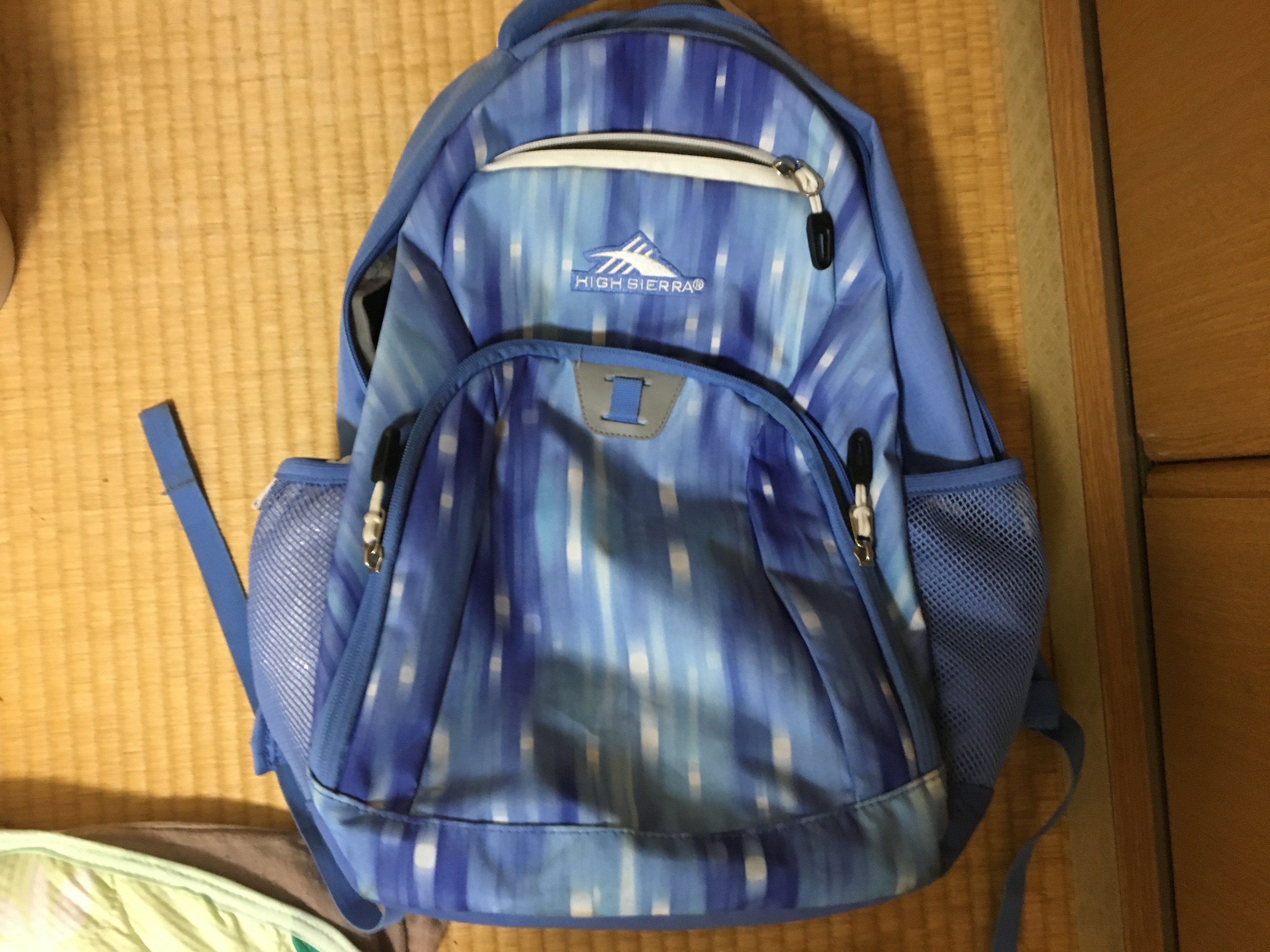
In your opinion, what kind of person uses this backpack? Is it appropriate for a middle-aged, straight male?
Looking back, I might not make the same choice yet I’m glad I made it.
—
My last official blog post was about going to see my favorite band, Phish, at the awe-inspiring Gorge Amphitheatre in central Washington and in it, I wrote about how I felt some social anxiety the day before leaving for the show.
At that time, I couldn’t really pin down why I felt anxious. However, with the clarity of hindsight, I think I understand now: I was worried life in Japan had turned me into an uncool geek who wouldn’t fit in at a Phish concert.
It’s weird for me to admit that for I’ve never been a person who really cares about fitting in. However, in my first four days back in the US before going to the concert I felt like a fish out of water, slow to recognize the cultural cues and behaviors of Americans. This didn’t bother me because I am a confident individual whose personal identity is not really tied into being a part of American culture.

The campground at a Phish show is an ever-evolving, unique sub-culture of America.
But I do care about being a part of the Phish community, a community that has its grounding in the hippie ethos of the 1960s but also has its own social codes and values. It’d been seven years since I had gone to a Phish show and a lot has changed in the world in those seven years, so would that also be true at Phish shows?
As a social chameleon who gets along with just about anybody I rarely have social anxiety so the fact I felt this before the shows was unusual and hard to understand.
But then again, perhaps I’m not being totally honest about my anxiety. Perhaps it wasn’t so much about being a part of the Phish community but being cool enough to hang with Dan.
—
Again, in hindsight, this fear also seems stupid. After all, Dan and I are tight and have been for almost 20 years.
Dan has always been like a hip older brother to me and that has made me want to impress him or at least not be a square in his eyes.
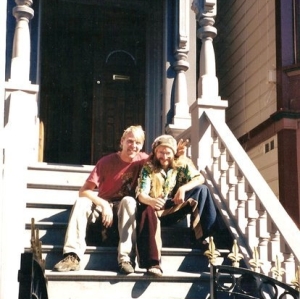
Dan and I have traveled all over the country to take in its natural wonders by day and get down at concerts at night. Here, we are on the iconic steps of the ‘Grateful Dead’ house in the Haight-Ashbury district of San Francisco.
The last shows we attended together were the Phish concerts at the Gorge in 2011 and Dan, who has had long hippie locks for as long as I’ve known him, joked that my haircut was “high and tight.” I defended it by telling him how hot summer was in Japan.
Still, he had a point so this time I got a haircut in mid-May and let my hair grow out so it was reasonably shaggy. Also, after shaving before my flight I didn’t shave for the next five days so I had a good bit of facial hair when we met that Friday. I’ve also kept myself in pretty good shape over the years, though I have added a middle-aged man’s gut.
In short, I wasn’t worried about my physical appearance. No, it was more my clothes that concerned me. I have a solid collection of t-shirts that are appropriate for a Phish show, but beyond that I was lacking.
So the day before meeting up with Dan, I bought a few things to wear and in the end, there was nothing wrong with my clothes.
No, in the end, it was that girly backpack that didn’t pass the test.
—
We are in Dan’s van preparing to go to the first show of three when Dan looks at my backpack and says, “You know, that’s a little fruity.”
Crap, I think.
Still at past shows at the Gorge I’ve become very cold after sundown so I decide to bring the backpack in so I can carry a long-sleeved shirt.
Considering what happened I could say this was a mistake, but I rather think it was a blessing in disguise and one of those meant-to-be things.
Not only was the backpack not necessary as it never got cold enough to need the long-sleeved shirt, it also hindered my fun on the dance floor. When I had it on my back, several times I accidentally ran into other phans and when I put it on the ground near my feet, I couldn’t dance as freely as I wanted.
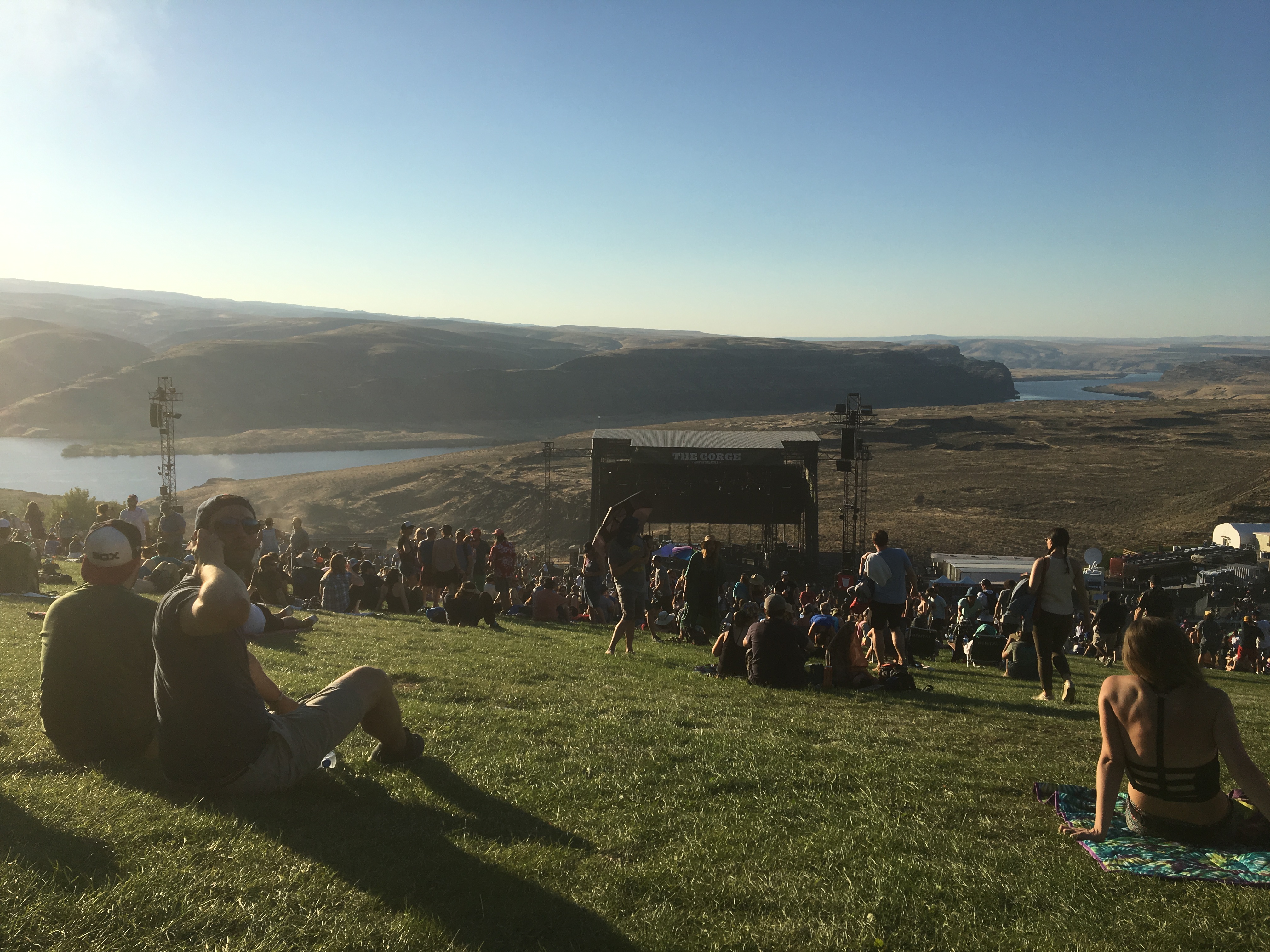
While it gets hot in the day at the Gorge, it can get pretty cold at night, especially if the wind wips up off the Columbia River.
This experience reinforced one of the lessons I kept learning on my trip: travel light. Reduce the amount of stuff you have and carry around and you’ll feel freer and happier.
So no, I didn’t need the backpack and had decided within the first 10 minutes of the concert not to bring it in the next day.
Still, it wasn’t until setbreak that the backpack would teach me its most valuable lesson.
—
I’m sure you are likely aware that Washington is one of the growing number of states in the U.S. where marijuana is legal for recreational use.
Before moving to Japan, I was a regular user of this plant, which I consider to be something of a miracle plant in how it enhances my sense of well-being and health.
However, these days I live without it because the laws against it in Japan are so ridiculously draconian (ironically, those laws were imposed on Japan by the US after WW2). So when I return to Washington where it is legal, I allow myself to indulge. As a result, I went into that first concert pleasantly stoned on some edibles so my senses were slightly distorted and my memory of the night has a certain, shall we say, haze to it.

Did the potent legal pot cause me to imagine this whole thing?
And right before setbreak a kind fan passed me a joint of quality reefer and then at the start of setbreak Dan and I smoked a little bit of the weed we had so I was most definitely high as we climbed to the top of the amphitheater to find a bathroom.
I was standing on top of the hill, looking out at the crowd when I began to hear the comments: “Another fag;” “Look at gay boy over there!”; “Hey, fucking queer!”
Fag? Gay boy? Queer? Who were they talking about? Are they talking about me?
I’d never really heard these sorts of comments before, but once I heard the first few, I started to hear more. I am still not sure if they were all directed at me, or even if I may have been hearing some of them due to my intoxication.
As I looked around the crowd, though, I realized there were some people that I’d never seen at a Phish show, people who looked like and carried themselves like Nazi redneck skinheads. And it seemed most of the homophobic comments I heard, some of which suggested they wanted to physically harm me, were coming from them.
Do gay people have to put up with this kind of shit every day? I wondered.
Of course, I know that there is homophobia in US culture. But at a Phish show?
Then, it got worse.
As I was waiting just outside the bathroom for Dan a dude who looked like he could have been a model for the Phish Hippie fashion magazine came out and gave me the most condescending, disapproving smile. He did not look like the kind of person who I’d expect that kind of behavior from.
Still, maybe I was imaging things. Maybe I had become super paranoid because of the comments on top of the hill and because of the cannabis I’d consumed. Maybe I misread his smile.
But I don’t think so. I think what I was realizing was that more people than I would have thought treat gay people like shit, even if it is only with a disapproving look.
What stood out to me about the experience was that once I heard the first few comments, it became almost impossible to relax the rest of the night, as I was often wondering if people around me were looking down on me, wished me harm or actually were going to hurt me. I even had one paranoid moment, when, after taking a hit off a joint from a guy with a buzzcut I wondered if he may have put something in it to harm me. Much as I knew this was irrational because he was also hitting it, when we have an emotionally heavy experience, our rationality is sometimes not enough to defeat such thoughts.
—
I have a gay cousin who told me, “I’m sorry that you had to experience this and yet I am glad you did—it validates what we as a community go through every day. We learn to cope and learn ways to shield ourselves.”
He added: “What you experienced was tame compared to what some of us have experienced. We have a friend who is somewhat unsteady on his feet … and we came to find out a few years back in Montana a group of guys jumped him as he came out of a bar and beat him senseless because he was gay. He spent four months in a coma and has permanent nerve damage. Nobody deserves this.”
No, they certainly don’t. And as a result of what I went through, I promise to be more outspoken and strong in support of oppressed groups.
—
All that said, a part of me had to laugh about my experience. It just felt so silly to me that because I had a backpack that looked “fruity” all of the sudden I became gay in the eyes of others. (I should add that I had a pair of new shows that are the same color as the bacpack so maybe that contributed to my appearing gay. I just don’t know.)
As my cousin wrote, “What’s Gay dress? We each have our own style—who’s to say what that style is? Fuck them! Lol.”
Right on!
I have a feeling if I brought the same backpack to a festival in Japan no one would give a shit. That’s not to say there is no homophobia in Japan. But because this is a country that is not founded on Judeo-Christian traditions and bigotry, men are allowed to be a bit more girly than in the US.
Besides, one of the things I like about myself is that I am in touch with both my masculine and my feminine side. I also think that, rather than making me weaker as some macho dudes think, this makes me stronger.
Anyway, fuck dudes like that. Fuck people who think it’s OK to harass, threaten or make fun of gay people or any opressed minority. They are ignorant fools.
—
Still, since when did such people start attending Phish shows? Had they always been there?
As I wrote in my previous post, “(Phish) phans feel like ‘at a show, treat everyone like a friend.’” That had been my experience at the previous 18 shows I’ve attended since 1996. I’d never felt threatened at a show, nor like there were even people there who wanted to threaten others.
But as I began to observe the crowd more, I realized that there were some people who were there to not only get fucked up (on booze or whatever), but to fuck up other people.
Sadly, this was all confirmed for me the Monday after the shows when I was scrolling through my Twitter feed and I saw a story about a middle-aged man and father of four who flew to Washington from Michigan to see his favorite band, only to be struck in the back of a head with a rock during the second set of Saturday night’s show, seriously injuring him (he is still in a rehab center near the Gorge and you can help with his hospital bills by going here). And it appears there were at least two other incidents like this and witnesses said the attackers had Nazi tattoos.

Joe Allen Jr.’s life was altered for the worse by his encounter with violent, hateful fans at the Phish concert in central Washington on July 21, 2018.
What the fuck?!?
—
I’m standing in a long line for the toilet, a series of “Honey Buckets” lined up in a dark hollow so that when you get to the front of the line you still can’t see if someone has exited from one of the Honey Buckets in the back.
Most people are following a protocol of just walking slowly through until a door opens. However, there are a number of jerks who not only walk past the line, but as they do, they are making comments like “Look at all these weak people, walk right past them!” “Fucking pussies, get out of the way!”
Again, I’d never heard this sort of shit at a Phish show before. Sure, I’ve seen selfish behavior, but previously such behavior was done silently, as though the people doing it knew not to be proud of it.
But in America 2018? I guess now it’s not only socially acceptable to be an asshole, but to be so proud of it that you boast to those you are being an asshole to.
Now, it would be very easy to blame all of this on the Orange Jerkwad in the Oval Office. And I will definitely say he and his boorish behavior deserve some of the blame.
My parents told me they’ve definitely noticed more selfish behavior since the election in 2016, such as in traffic. And my cousin told me that bigots have been emboldened as a backlash against the common rights that gays have gained over the past several years.
While I think ths is true, I also think what is happening goes deeper. I believe that, on the collective level, humanity is facing a Dark Night of the Soul where the unconscious is becoming conscious and this means that some of those until-now hidden, sometimes-ugly behaviors are becoming public.
In some way, it is as though hidden aspects of each of us is being revealed.

The rise of Nazi racists in the U.S. reveals an ugliness in the culture that must be addressed.
And on that Friday night, I became aware that some of those hidden aspects are just downright ugly. And all it took for me to see this was to bring in a “fruity” bag. I can only imagine what more flamboyant gay people put up with, not to mention what people of color deal with.
Like I said, it really sucks.
All this said, I don’t want to leave this post in such a dark place. We have to be honest about the shadow side of humanity. However, it is just one side of us. And over the next two nights, I saw that there is also a bright light that is being revealed as well, that humanity is still, at its heart, a mixed bag of crapiness and awesomeness.
In an upcoming post, I’ll explore that light and leave you feeling better about the world. Until then, thanks for reading!!
Shameless Self Promotion Time: If you enjoy my writing, please check out my novel, “The Teacher and the Tree Man.” The full 80-chapter story can be purchased as an e-book or as a paperback from Amazon or as an e-book at Smashwords. You can also purchase the book in each of the 20-chapter “books” (there are 4, for a total of 80) at Amazon as well (book 1, book 2, book 3 and book 4). If you are a member of Amazon’s Kindle Unlimited like I am, you can read the individual books for free. If you like reading and discovering independent authors like me, I highly recommend joining Kindle Unlimited!
Here is a bit from the synopsis: “The Teacher and the Tree Man” is a modern American epic fable about a Teacher in love with Nature who discovers a human head, a Tree Man, living in a tree in a forest near his house. The novel is about our need to unplug from our culture and re-discover ourselves in Nature. It is a fun-yet-deep look at: the media, our education system, drugs in our culture and our inability to listen to each other in the political arena.
My Every-Four-Years Relationship with Football, er, Soccer (Pt 1, the Fun Part)

Every four years, I care about football. Sort of.
No, not the football Americans play, but the football that actually has players frequently using their feet to kick the ball, which Americans call soccer and which leads to confusion for me as an English teacher in Japan. The Japanese word for the sport comes from soccer (“sakkaa” サッカー), but when they talk about the US game of football, they usually call it “American football” so they are aware that “football” means for most of the world what Americans call soccer. Confused yet?
For the sake of clarity, I’m gonna stick to my American guns and refer to the sport as “soccer” throughout the rest of this article, and football will mean “American football.” That said, please understand I agree with my international friends who make fun of us Yanks for calling American football “football.”
Anyway, you may be aware that there is this giant international sporting event that started this weekend, where grown men will attempt to kick a black-and-white patterned ball past another group of grown men into a net, causing meltdowns amongst the masses depending on the result. Yes, that’s right, it’s World Cup time, and for the next month it comes to us live from Russia. (Insert Trump-Putin joke here, if you must).

Putin: “I have the World Cup, he has tiny fingers.”
Back in February I wrote a two-part blog post about (American) football in which the first part was about my positive experiences with the game and part two was focused on the dark side of the sport and how I will likely boycott the NFL this fall.
With the next few weeks being the only time every four years I will pay much attention to soccer, I realized that perhaps I ought to give the same sort of treatment to it: this week, I’ll talk about the things I admire about the sport and my positive experiences with it, and next week, I’ll dig into the game’s dark side and give you good reason to never watch again!
With that intention laid out, let’s get into it.
—
Saturday morning: Wet grass, soggy clothes, smashed toes Miserable kid
This lame attempt at a haiku sums up my childhood memories of playing soccer until I was about seven years old.
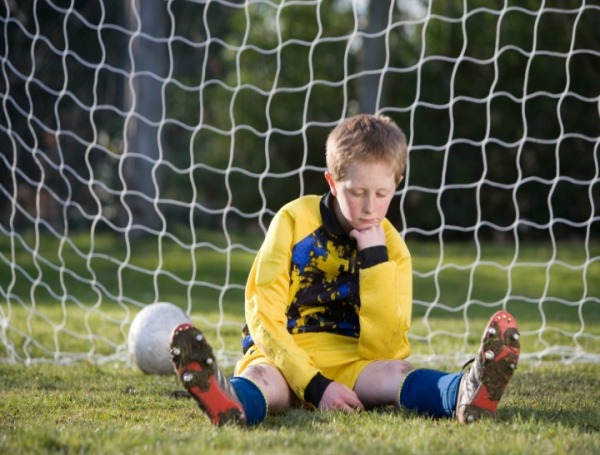
I get how you feel, kid.
In spite of the fact that soccer takes a backseat to football, baseball and basketball in American sports, it is still one of the more popular youth sports. When I grew up in Washington, youth leagues were usually held in the fall and that meant it was often a rainy, wet affair.
As someone who doesn’t really like running, in one of my final practices my coach allowed me to try being keeper which I was enjoying until, during a time out, some jerk kicked a ball that hit me square between the eyes, knocking me to the ground. I’m pretty sure my short soccer career ended shortly after that.
I probably didn’t give the sport much thought for the next decade until high school when my baseball teammates and I struck up a rivalry with the guys on the soccer team. It was mostly a friendly rivalry, but it hardened my bias against the “beautiful sport,” which to me just seemed like a boring way to tire yourself out if you played it, and a boring way to put yourself to sleep if you watched it.
No, it wasn’t until I was living in Los Angeles during the 1994 World Cup that my attitude toward soccer changed.
With my car being held hostage by a nefarious, money-siphoning auto shop that summer, one day I decided to take a ride on the dreaded Los Angeles city bus and found myself in the midst of a Carnival-style party with a bunch of fans of the Brazilian soccer team.
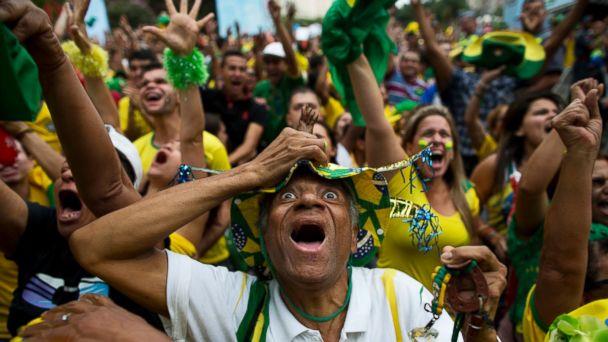
Brazilians are passionate folks, especially about “the beautiful game.”
Apparently, they’d been out somewhere watching their team win a World Cup game and had imbibed many adult beverages. Being a 21-year-old guy who enjoyed a good time, I instantly started chatting with these vivacious folks and, well, they told me I simply had to watch the World Cup, especially their beloved Brazilians.
I told them I didn’t like soccer and that almost ended the conversation, but they were persistent. Watch for “the passion” of the game, they insisted.
So I did. And as I watched the game and listened to the roar of the crowd and all the various chants, I began to be won over. The play on the field still seemed kind of slow to me, but I could feel the energy through my TV screen so I began to tune in to matches when I could.
—
The more I did, the more I began to appreciate the game itself. My rejection of the “slowness” of the game or the “lack of scoring” was, I think, mostly a typical, surface rejection made by someone who had never given the sport a chance.
After all, my favorite sport was (and still is) baseball and baseball is not exactly an action-packed display of athletic bravado. In fact, as a former pitcher, one of my favorite kinds of baseball games are pitcher’s duels, where neither team can get across a run against the brilliance of the opposing pitchers (in fact, one of my very favorite baseball games ever was the 2006 Japanese Summer High School Tournament championship game in which future New York Yankees hurler Masahiro Tanaka dueled a kid known as the Handkerchief Prince to a 1-1 deadlock over 15 innings that forced a rematch the next day).
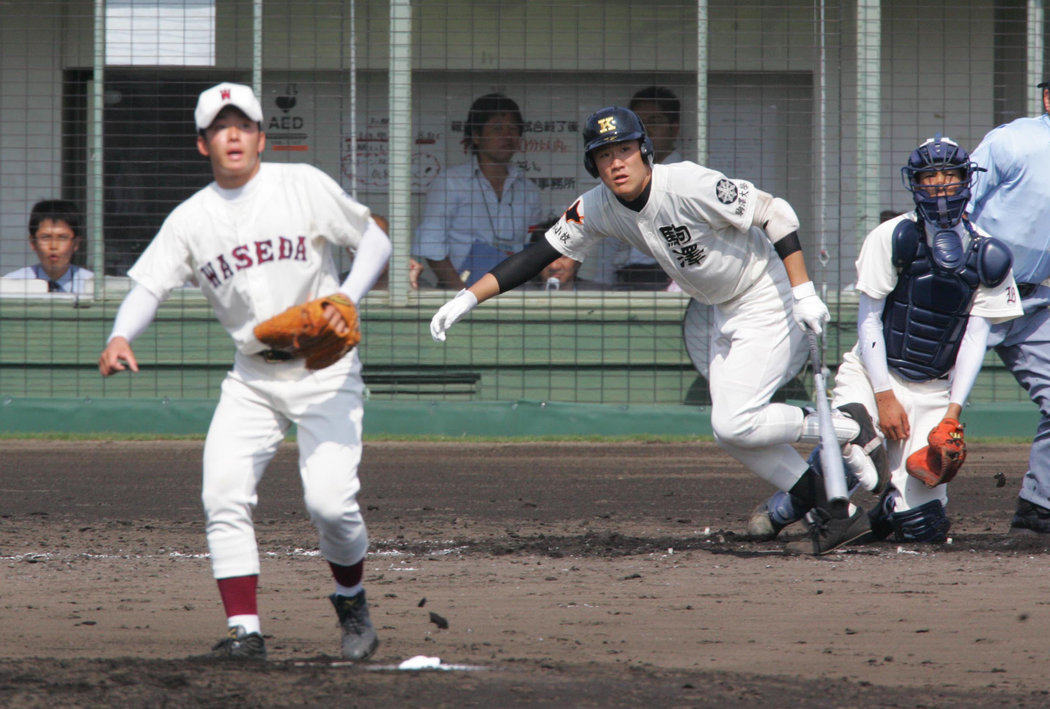
Yankees pitcher Masahiro Tanaka bats here in one of the greatest sporting events I’ve ever seen.
I began to see that because of how few goals are scored, when a team finally breaks through for one, it is a moment of pure elation. I also started to understand the excitement of each scoring chance and the disappointment when it was turned away. Such chances can be very hard to come by, after all.
I also began to notice the intricacies of the way different teams played different styles. I can still remember there was a team from Romania in that 1994 World Cup that was famous for a counter-attack, where one very fast player, I think he may have even been a defender, would split off as his teammate intercepted the ball and then would receive a long pass that he’d run under to set up a one-on-one with the keeper.
And then there was the expert way the players handled the ball; there really was artistry to it and, as a basketball fan who appreciated expert dribblers, it wasn’t too much of a stretch to appreciate these guys who dribbled with their feet.
The point is, the more I actually took in the whole game with an open mind, the more I began to understand its appeal and enjoy myself.
Flash forward to 2002. That was the year that Japan and South Korea hosted the World Cup and that was also the first summer I knew my future wife. Because some of the games were being hosted in her country, the World Cup became a topic of conversation. Adding to my interest was the fact that the US team actually had a pretty good run that year.
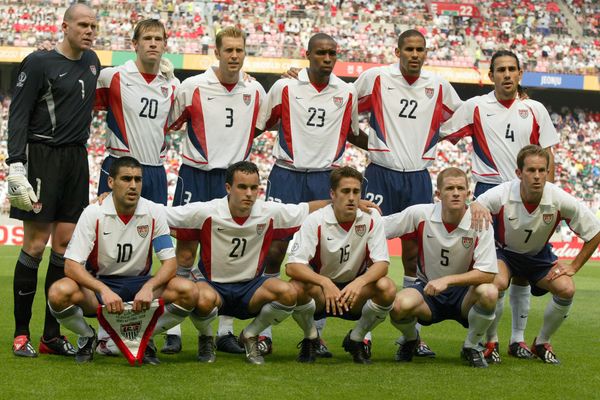
The 2002 US soccer team had its best World Cup in the modern era.
Now, I tend to cheer against the US in international competitions because their teams are just too strong. This is especially true with the US basketball teams. I can still remember the first “Dream Team” in 1992 and how in one of the early rounds, Charles Barkley elbowed aside a much smaller player from, I believe, Angola, and it just made me feel gross to be an American. So, yeah, screw the Dream Team (and OJ’s lawyers, too).
But with the US soccer team, well, they are just one of many and are never a favorite to win the World Cup. In fact, the best the US has ever done in the tournament is third place (back in 1930) and it didn’t even make the tournament for 40 years from 1950 to 1990.
So they feel like a comfortable underdog to cheer for. When the US team actually got out of the group stage in 2002 and then faced and defeated rival Mexico, 2-0 to make the quarterfinals, well, all of the sudden I had a rooting interest in the competition.
Unfortunately, while the US has made it out of the group stage to the knockout round in two of the three World Cups since 2002, they’ve never gotten as far as they did in 2002 and this year they didn’t even make the tournament after losing to Panama. Still, cheering for the US is a nice bonus to pay attention to the World Cup, but not the main reason I enjoy it.
One of the reasons I love living in Japan is because I have friends from many countries and, well, many of them care about football. Since moving to Japan in 2004, I’ve had some pretty fun nights during the World Cup with my non-American friends. The one that stands out the most was going to an English friend’s house and watching England win a group stage match, my friend getting drunk and then walking around the streets draped in a Union Jack flag, singing various British football songs. I’ve always been a person who can sort of siphon off the energy of my friends so I enjoy participating in things that friends really enjoy, even if it’s not my thing. For example, I went to a Rolling Stones concert with a pal who is a huge Stones fan and it was just a blast being there with him, even if I think they are an overrated band.
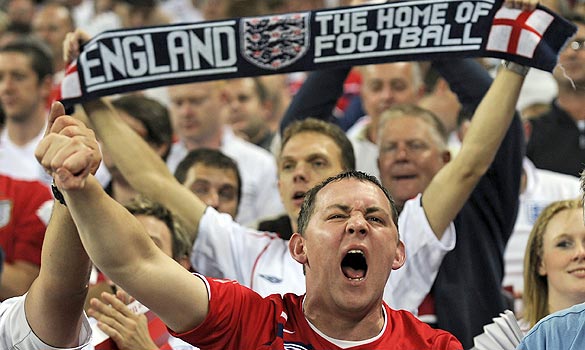
Hanging with crazy non-Americans who love their “footie” is one of the reasons watching the World Cup in Japan is fun.
So I’m hoping that for this World Cup I’ll be able to get out on the town or to a friend’s house for a least one game. Most of the games are on between 9 p.m. and 3 a.m. here so it’d be a late night for me (in my old age, I usually go to bed at 10, 11 or 12 at the latest!).
Ultimately, there’s this idealistic part of me that wants international sporting competitions to be excuses for citizens of the world to get together and have a good time. Perhaps they’ll also be able to appreciate the diversity of their various cultures along the way and recognize that this diversity gives the human experience vitality. In times like these where it feels like the world is increasingly at odds with itself, such sentiments feel even more important to me.
Before I close, I want to briefly touch on some of the teams I’ll be rooting for in this World Cup: Uruguay, Iceland and Japan. Why?
Let’s start with Uruguay. My general rule of thumb with the World Cup is to cheer for teams from South America and Africa, figuring that the Europeans (and America) already take enough of the spoils of the world.
And in the case of Uruguay, it’s also a pretty kick-ass country, even being named country of the year in 2013 by The Economist magazine. It’s the most liberal country in South America, ranking first in Latin America in democracy, peace, e-government and low perception of corruption, and is first in South America in press freedom. It also allows abortions and same-sex marriage. Considering that the World Cup is being hosted by Russia, a country where anti-LGBTQ laws are very strong and where there are fears of violence against LGBTQ fans who attend the matches, a Uruguay win could be a nice way to rub some you know what into Russia’s bigoted face.
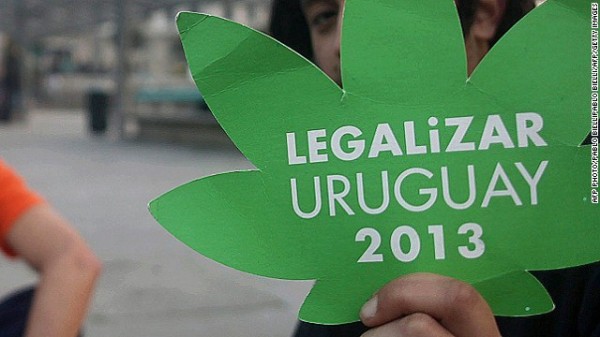
If, like me, you don’t care about the on-the-pitch reasons to cheer for a team, why not cheer for freedom-loving Uruguay?
If all that’s not enough, in 2013 Uruguay became the first country in the modern era to legalize cannabis for recreational use! So light up a fat one and cheer on the Uruguayans!
Iceland is the darling of this year’s World Cup, becoming the smallest country by population (just 348,580 people!) to ever make it into the tournament. That also makes them a real long shot, with odds of 400 to 1. But their country has invested heavily in soccer over the past decade, and now has over 600 coaches, half of which hold a B license from Europe’s governing body of soccer, UEFA, when they had zero with that license as recently as 2003. They’ve also built 150 miniature indoor pitches, most next to schools, so kids can practice easier. As a result, Iceland has the second highest rate of soccer participation in Europe and have moved up in the FIFA world rankings from around 120 in 2010 to 22nd in the most recent poll … three higher than the US. But they’ve got a very difficult group, with experienced World Cup foes in #5 Argentina, #20 Croatia and #48 Nigeria. Still, why not cheer for them? After all, they also have really cool blue jerseys!
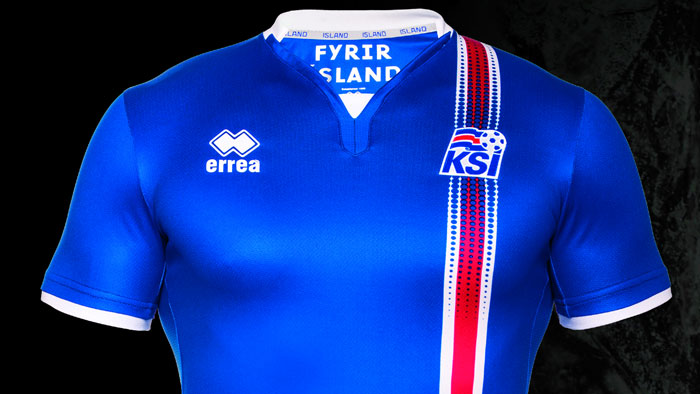
Iceland’s blue uniforms are pretty flashy, eh?
Last, there is Japan. Living here, I feel sort of obligated to cheer for Samurai Blue, but the team is in a transition phase and most are shocked they are even in the tournament. In most years, I tend to actually cheer against them as I think this country already has too much nationalistic pride and I’ve never liked feeling like I have to do what everybody around me is doing. But because they are so lousy this year (their odds are even worse than Iceland’s at 500 to 1), I feel like it’s probably a good look to cheer for them … and will do so until they get knocked out of the group stage as they also have a tough bracket with #8 Poland, #16 Colombia and #27 Senegal.
Okay, folks, the soccer, er football, has already started but you’ve only missed the first few days if you haven’t tuned in until now. If you’re not a fan or have negative ideas about the sport, why not try watching it with an open mind and see if, like me, you can carve out a small space for at least the World Cup to be enjoyed every four years? With that said, enjoy the soccer, go Uruguay, Iceland and Japan and thanks for reading!
Shameless Self Promotion Time: If you enjoy my writing, please check out my novel, “The Teacher and the Tree Man.” The full 80-chapter story can be purchased as an e-book or as a paperback from Amazon or as an e-book at Smashwords. You can also purchase the book in each of the 20-chapter “books” (there are 4, for a total of 80) at Amazon as well (book 1, book 2, book 3 and book 4). If you are a member of Amazon’s Kindle Unlimited like I am, you can read the individual books for free. If you like reading and discovering independent authors like me, I highly recommend joining Kindle Unlimited!
Here is a bit from the synopsis: “The Teacher and the Tree Man” is a modern American epic fable about a Teacher in love with Nature who discovers a human head, a Tree Man, living in a tree in a forest near his house. The novel is about our need to unplug from our culture and re-discover ourselves in Nature. It is a fun-yet-deep look at: the media, our education system, drugs in our culture and our inability to listen to each other in the political arena.
Exploring Geography Through Media and Technology

Did you know there are two major Colorado Rivers in the United States? The more famous one has spent the past six million years carving through the Grand Canyon and its waters are essential to the lifestyle of the American Southwest. So much so that it hasn’t even reached the ocean for 50 years or so!
And while that Colorado River runs 1,450 miles and has a watershed that drains seven American states and two Mexican ones, the other Colorado River runs 862 miles through Texas, right through its capitol of Austin, and is the 18th longest river in the United States.
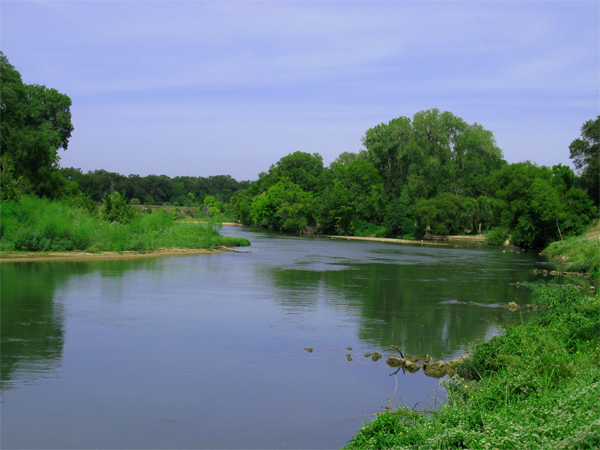
This pleasant Colorado River is the longest river that both starts and ends in the Lonestar State of Texas.
Now, I’ve spent many of my 45 years looking at maps, reading atlases, and just generally geeking out on geography, but Inever knew about this second Colorado.
How, you might ask, did I learn such a thing as a middle-aged dude? By watching Netflix, of course! Specifically, by watching season two of Netflix’s dramatic interpretation of the life of Mexican drug lord El Chapo, titled (you guessed it) El Chapo.Now, I can hear the voices of those of you who have been watching or have watched this show screaming through your screens at me now: Wait, that show is based in Mexico, not Texas!
Yes, you’re right. I’m only six episodes into season two, and so far, I’m pretty sure they haven’t gone anywhere near the Colorado River of Texas. But still, it was through the show that I learned about this river.
Let me explain: I’m guessing you’ve heard of the app called Google Earth? In short, it’s a geography nut’s dream come true. You can go all over this fascinating, huge planet with this app, exploring maps, reading links about places and looking at 360-degree pictures that put you right there. In a little bit, I’ll demonstrate.
But first, let me explain the Netflix/El Chapo/Google Earth/Colorado River connection.
One of the things I love about Netflix is how many shows it has from various countries around the world.

This Indian comedian’s special on Netflix gave me a broader perspective on life in India and our world
I’ve watched a sci-fi dystopian drama from Brazil (“3%”), a drug war epic filmed mostly on location in Colombia (“Narcos”), a time-travel mind-twister from Germany (“Dark”) and the aforementioned, El Chapo. Oh, and a comedian from Indiaand one from South Africa.
When I watch these shows, my perception of the world grows even broader. Not only does watching shows filmed in unfamiliar places help me have a more complete picture of our planet, but I love listening to them in their native language (with English subtitles, of course!) to help me get an even greater sense of being in those places.
But invariably what ends up happening as I watch these shows filmed in exotic locales like Nuevo Laredo, Mexico, Cali, Colombia and the German countryside is my curious nature will get the better of me, I’ll open Google Earth to find these places and, well, I’m off.
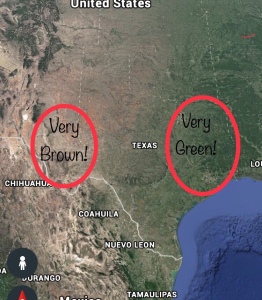 So in the case of finding the Colorado River, after looking at Nuevo Laredo and then zooming out a bit, my eyes noticed that eastern Texas is much greener than western Texas. So I started zooming in on various areas of Texas, occasionally opening photos and becoming fascinated by the geographic diversity of that amazing state.
So in the case of finding the Colorado River, after looking at Nuevo Laredo and then zooming out a bit, my eyes noticed that eastern Texas is much greener than western Texas. So I started zooming in on various areas of Texas, occasionally opening photos and becoming fascinated by the geographic diversity of that amazing state.
Then I recalled how people had said that Austin was like an oasis, both culturally and ecologically, in the center of Texas so found myself looking at Austin and …voila! … what’s the freakin’Colorado River doing in Texas?
I know for sure that the Colorado starts in, um, Colorado, I thought. And that it flows south-southwest through Utah and then the Grand Canyon before emptying into the Gulf of California (well, I stand corrected on this last fact. While I’ve known since reading a book about Las Vegas about 15 years ago that the Colorado was rapidly being drained, much of it to serve Las Vegas’ vast electric needs, I didn’t realize it didn’t even reach the sea anymore!).
So, I did a little Internet investigating and that’s how I learned those facts at the start of this post. Now, you may be thinking that Texas stole the name or something from its mountainous, pot-loving state to the north, but the fact is that the word “colorado” simply means “colored red” in Spanish. Thus, it probably won’t surprise you to learn there are five other Colorado Rivers located outside the U.S. And if you really want to go down a geographical Internet rabbit hole, type in “Red River” into Wikipedia and you’ll find that there are 16 rivers around the world with titles that are either “Red River” or related to it, and that does not include these Colorado Rivers (not sure why the Spanish for “colored red” rivers don’t get bunched in with places in languages that aren’t Spanish like the Baloue River in Mali (means “red river”) and the Halys River in Turkey (“Red River.”)).
 But now, after learning about all these Red Rivers, my fingers want to stop their typing for this blog and click on one of those places. So I do, and learn that there is a genre called “historical fiction manga,” because, according to Wikipedia, “the historical fiction manga Red River is named after and largely set in the Kilzirmak Basin in Turkey during the age of the Hittites.
But now, after learning about all these Red Rivers, my fingers want to stop their typing for this blog and click on one of those places. So I do, and learn that there is a genre called “historical fiction manga,” because, according to Wikipedia, “the historical fiction manga Red River is named after and largely set in the Kilzirmak Basin in Turkey during the age of the Hittites.
Do you see how this works?
Now, I was going write a media review to finish off the first full month of blog posts of 2018. But in January, there weren’t any media that really captured my attention. I’ve read or heard some interesting books (“The Solandarian Game: An Entheogenic Evolution Psy-Fi Novel” and “The Force” (audio version) top the list), watched some good NFL football, including a classic, have enjoyed the usual podcasts, some music (including getting back into a long-time favorite band, the Disco Biscuits, via their free concert streams on YouTube and the Nugs.net app) and watched a few interesting documentaries, the aforementioned “El Chapo” and one of my favorite episodes of “The X-Files” ever.
That last one could easily deserve a review, but I saw it late Thursday night and had already written the rough draft for this post and am too busy this weekend to give that episode the time it deserves. Just watch it, folks. If you like having fun at the expense of conspiracy theories (as well as the current occupant of the White House), it’s a blast.
I briefly considered writing a post about “El Chapo” and “The Force” because they both fit into a genre I’ve long enjoyed, which I’ll call drug/crime. But I’ve yet to finish “El Chapo” and I believe the reason I’m going so slowly through that show is because it is such a heavy show, lacking even small moments of lightness or humor. People dog on “Game of Thrones” at times for being heavy and violent, but one of the reasons I love that show is because it can also be very funny and usually has moments of humor in every episode.
Anyway, this is a bit of “inside baseball” about the process of putting this blog out. It was only on Monday night when I started thinking about how I’d discovered the Colorado River via El Chapo that I hit on the idea of writing about how we can learn geography and about our world through the media we consume. And how easy this is to do in this day and age.
Even though I’m writing this from Japan, I feel much more connected to the world than I ever did growing up in the United States in the 1980s. It wasn’t like I was lacking resources; my parents got our family a computer in 1982 (Apple II plus!) and we had many books, including a giant atlas with colorful maps in it, for me to learn about my world from. But nowadays, it is just so easy to retrieve information.
In some ways, too easy, because getting distracted from one’s tasks with Internet-aided knowledge retrieval is hard to avoid. I’ll save a discussion about that for a future post.
Before I close, why don’t we have some fun? I want to share a function on Google Earth that I really love as a way of learning about the world in an un-directed way. So, pack your metaphorical bags and let’s blast off…
—
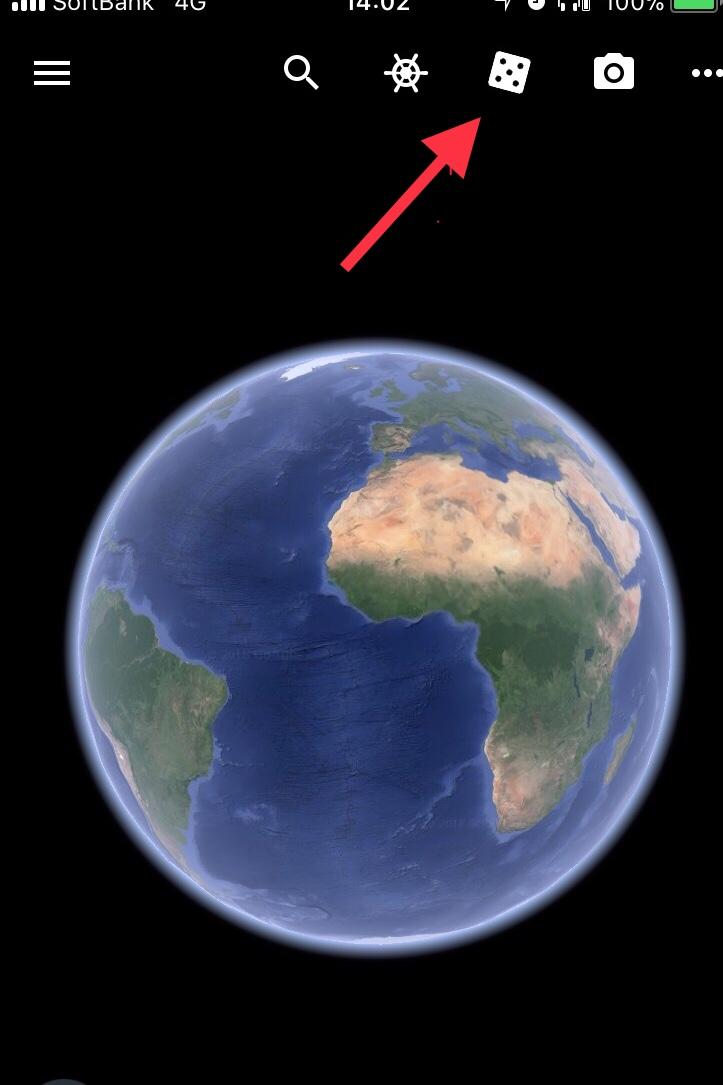 I’m assuming this function looks the same no matter what platform you are using, but if you look at the picture on the right (a screen shot from my iPhone of Google Earth after I just opened it), you’ll see what looks like a dice in the menu options above. If you click on it, the app will take you to a random place on our lovely planet. Let’s try, shall we? Here we go…
I’m assuming this function looks the same no matter what platform you are using, but if you look at the picture on the right (a screen shot from my iPhone of Google Earth after I just opened it), you’ll see what looks like a dice in the menu options above. If you click on it, the app will take you to a random place on our lovely planet. Let’s try, shall we? Here we go…
Our first visit takes us to, well, would you look at that, the Narita-san Shinso-ji Temple here in lovely Japan, not so far away from where I live. In fact, there’s actually a family connection to this temple, which according to the app was founded in 940 AD!
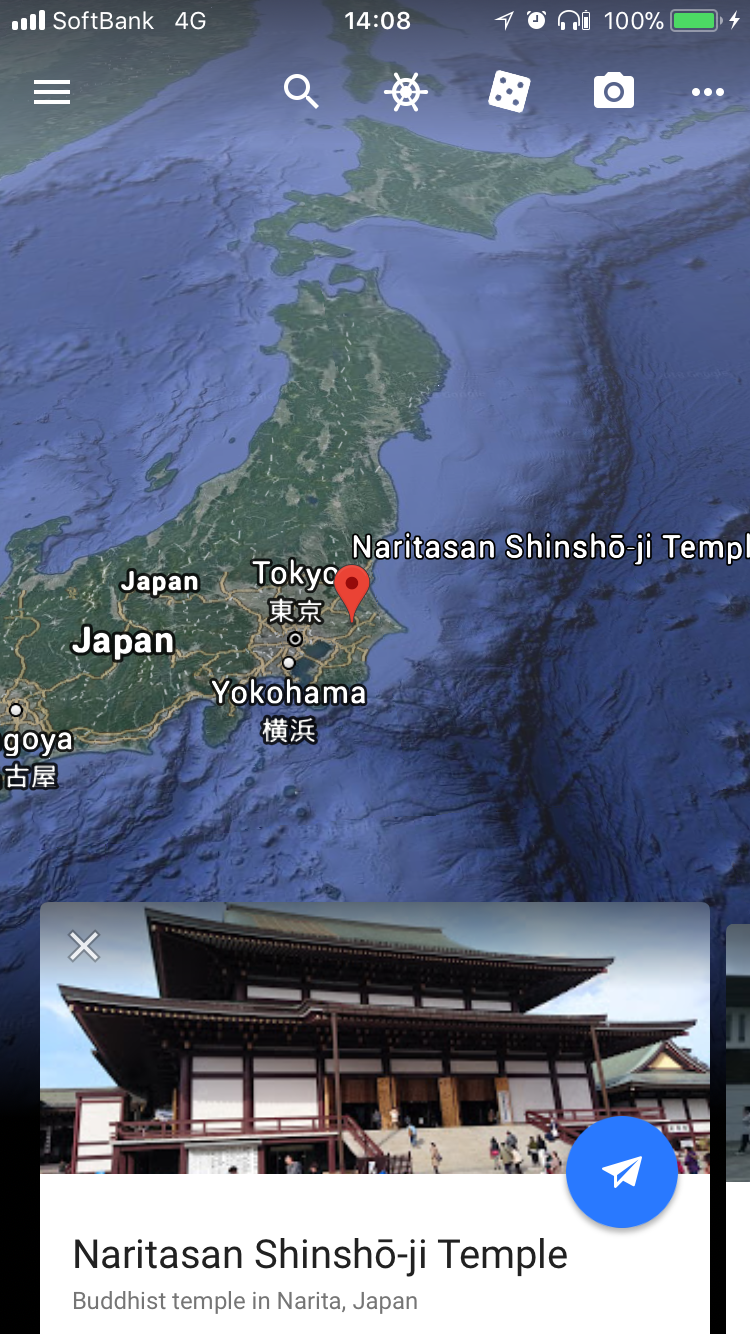 And that connection is my father-in-law used to make an annual trip on New Year’s Eve to this famous Buddhist temple. To be honest, I’ve never actually talked to him about why but according to a few clicks to the Wikipedia entry on “Oshogatsu” (Japanese New Year), “at midnight on December 31, Buddhist temples all over Japan ring their bells a total of 108 times to symbolize the 108 human sins in Buddhist belief, and to get rid of the 108 worldly desires regarding sense and feeling in every Japanese citizen.” Jesus, there are 108 sins in Buddhism! I thought seven was a lot. Anyway, I could attempt a poor joke about my father-in-law getting his bell rung every year, but let’s move on, shall we?
And that connection is my father-in-law used to make an annual trip on New Year’s Eve to this famous Buddhist temple. To be honest, I’ve never actually talked to him about why but according to a few clicks to the Wikipedia entry on “Oshogatsu” (Japanese New Year), “at midnight on December 31, Buddhist temples all over Japan ring their bells a total of 108 times to symbolize the 108 human sins in Buddhist belief, and to get rid of the 108 worldly desires regarding sense and feeling in every Japanese citizen.” Jesus, there are 108 sins in Buddhism! I thought seven was a lot. Anyway, I could attempt a poor joke about my father-in-law getting his bell rung every year, but let’s move on, shall we?
Our second visit takes us to a lovely tropical island called Utila, “one of the Bay Islands of Honduras, in the Caribbean, north of the mainland. It’s known for its coral reefs and many dive spots.” Apparently, it also has a famous endangered spiny-tailed iguana and some great nightlife. Iguana shots, anyone? Oh, and just looking at the map, for some reason my app is highlighting a place called “Pumpkin Hill Beach” and if you really want to have fun with this app, the key is to let your curiousity guide you and, well, as a fan of oddly named places, I just can’t pass up a chance to check out this beach. I mean, are there going to be jack-o-lanterns leering from the hillside overlooking the Caribbean? Let’s find out…
So, what you do is you enlarge the app and click on that little man in the bottom left corner and, especially in a remote place like this, hope someone has been kind enough to take some photos and upload it to the Google monster.
When I did that, I found there were three places on Pumpkin Hill Beach to click on to see photos. The first put me on a hillside rather than a beach and while there weren’t
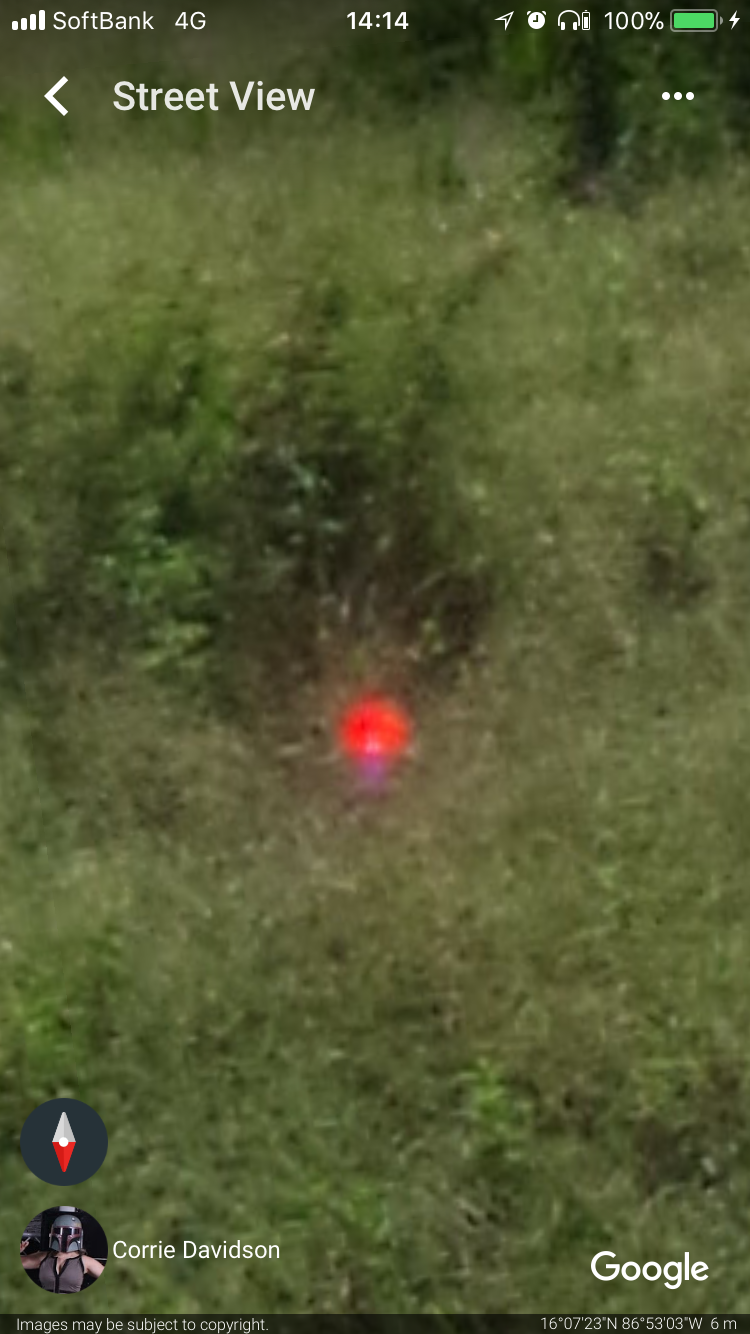
One of the fun aspects of Google Earth is looking at the photos and finding oddities, such as this red orb on Pumpkin Hill on a remote island off the coast of Honduras.
any pumpkins around, there was a mysterious red orb-like object that may be the Attractor at the End of Time that Terrence McKenna once babbled about.
The second picture is more what I was expecting, an actual beach with some weird creatures and a gal walking her dog.
The last photo was probably the most scenic of the bunch, and not only do we see dog-walking lady again but it appears the famous Pumpkin Hill is in the background. Maybe the jack-o-lantern army hides at night?
Okay, folks, let’s do one more roll of the dice before calling this a day. Here we go…
Our third and final visit takes us to the Mosque-Cathedral of Cordoba in Spain.
Okay, the cathedral, “whose ecclesiastical name is the Cathedral of Our Lady of the Assumption,” is likely assuming I’m going to click on the Wikipedia entry to learn more about her, but no, much as I can appreciate architecture, I’m more of a Nature guy and well, Spain is a country I’ve long wanted to visit and though I’ve heard of Cordoba, I couldn’t tell you where in Spain it is located, so why don’t we zoom out and get a good shot of Spain and find that out, shall we? There she is, Cordoba, located in southern Spain in the region of Andalusia.
 Well, folks, I don’t know about you, but I could do this all day and this post, which was meant to be a bit shorter and easier to write because I’ve got a busy weekend instead of my usual time off, will end up taking several hours to put together. So for now, thanks for journeying with me and see you next week!
Well, folks, I don’t know about you, but I could do this all day and this post, which was meant to be a bit shorter and easier to write because I’ve got a busy weekend instead of my usual time off, will end up taking several hours to put together. So for now, thanks for journeying with me and see you next week!
(Postscript: I forgot to mention that using this app in this way is a great way to help your kids learn about the world and let their own curiosity develop.
My 12-year-old son is not a very enthusiastic student, but when I showed him this app and this particular function, after we played around with it together for about 15 minutes, I went and took my evening bath and came back 30 minutes later and he was still using it! The moral is, I think too many parents focus on the dark side of the Information Age and thus are blinded to its bright side. Here’s hoping that this blog post may contribute to sharing a little light.)
Shameless Self Promotion Time: If you enjoy my writing, please check out my novel, “The Teacher and the Tree Man.” The full 80-chapter story can be purchased as an e-book or as a paperback from Amazon or as an e-book at Smashwords. You can also purchase the book in each of the 20-chapter “books” (there are 4, for a total of 80) at Amazon as well (book 1, book 2, book 3 and book 4). If you are a member of Amazon’s Kindle Unlimited like I am, you can read the individual books for free. If you like reading and discovering independent authors like me, I highly recommend joining Kindle Unlimited!
Here is a bit from the synopsis: “The Teacher and the Tree Man” is a modern American epic fable about a Teacher in love with Nature who discovers a human head, a Tree Man, living in a tree in a forest near his house. The novel is about our need to unplug from our culture and re-discover ourselves in Nature. It is a fun-yet-deep look at: the media, our education system, drugs in our culture and our inability to listen to each other in the political arena.
A Random Day in the Life of a Japanese Elementary School
(This is again intended for my new blog, which I hope to create over my three-day weekend! But for now, I will share it here.)
In this, my first official post about life in Japan, I am going to describe a normal Thursday for me as an assistant English teacher in the Japanese public school systems. Thursday is the one day of the week when I teach at elementary school. The other four days, I teach at junior high. So today let’s delve into life at a Japanese elementary school for an English language teacher from America.
My attitude about teaching elementary school has gradually changed since I started teaching a decade ago. In short, I used to sort of dread this busy day, but now I’ve come to appreciate and like it. Mostly, this is because I like the change of pace from my four days at junior high and I enjoy the energy of younger kids. Much as I enjoy junior high kids (yes, I’m strange!), I love the playfulness of elementary school kids, and I play a lot with them. With the boys, I often do fake gun battles with our hands where I simulate goofy deaths when they shoot me (I have a feeling this would be a big no-no in US schools, right?). With the girls, I often make fun of the “crazy” boys. Mostly, I try to find ways to be jovial and silly and the kids love that. When I first started teaching here, they told us the number one goal of elementary school English is to make it fun so the kids will “develop a good attitude about English.”. So basically, I am getting paid to have fun. Sign me up!
Okay, let me walk you through a regular Thursday. I usually leave the house around 7:10 for a 25-minute bicycle ride to school. It is a nice bike ride through a flat, suburban-rural landscape of houses and rice fields, across a bridge over a river and then into the small neighborhood where I work (Shinmachi, which until it was absorbed by my city of Takasaki nine years ago, was the smallest city in Japan).
The school I work at is a bit small for a Takasaki public school, about 350 kids. Each grade has two classes, except for the second grade which has three. The class sizes range from around 20-25 kids for the first and second grade classes (I believe they can’t get over 25 by national law), and between 30 and 40 students for the other grades. And each class is 45 minutes long, with a twenty-minute morning recess, twenty minutes of cleaning time after lunch where the students clean the school and then a twenty-minute afternoon recess.
After I get to school, I usually have two or three morning meetings with the teachers I have classes with that day. The meetings are usually no longer than five minutes. I have been creating the plans for the past two years, and because they have a consistency to them the teachers don’t need a lot of explanation. Sometimes they request something different or have ideas of their own, but usually the meeting is just a formality where I can also confirm which period the class is in (the schedules seem to change a lot at Japanese schools!).
Most weeks, I teach three grades: usually both 5th and 6th grade and then one other grade. The reason I teach fifth and sixth grade most weeks is because about five years ago the national government decided that they wanted to increase elementary school education in those grades. Seems they are concerned about how they are falling behind South Korea and China in English education. There is a lot of animosity and competition between the Asian countries, and perhaps I will devote a post to that issue someday.
My job title is ALT (Assistant Language Teacher) but in elementary school, I am usually the main teacher. This means I prepare the lesson plans in Japanese early in the week, deliver them to the elementary school usually on Tuesday or Wednesday (so the teachers have time to look them over) and then we have the meeting on Thursday morning. And in class, I am the main teacher in most classrooms (there are rare teachers who want to run things and that is fine with me!). I enjoy this because, unlike junior high, I can run the class. English classes (thus far) have no homework or tests and the goal is to make it fun, so it is a pretty low-pressure teaching gig.
After the meeting, it is time to hit up the automatic green tea machine! This is one of my favorite things about my elementary school. Get a cup, push a button, and voila, green tea! I really love green tea, perhaps even more than coffee. But I only drink it at elementary school because, well, I am lazy about preparing food and drinks. And at the junior high, there is a coffee pot, but no green teach machine, so to make green tea takes more time. So it’s one of my treats about elementary school—lots of green tea!
Now, let’s look at what I teach. It is VERY basic. For the younger grades, the main question and answer form is “What ___ do you like?” And then we fill in the blank with “sport/animal/food/color/subject.” So I pray that all my elementary school kids can at least master this grammar point by the time they graduate! With the fifth and sixth graders, we get into other stuff like “What can you do?” “When is your birthday?” and “What do you want to be?” Still, we don’t teach them writing and there is very little reading in elementary school. In the third grade, kids are taught to read capital letters, but many don’t learn lowercase until junior high. We have a unit in sixth grade where we teach them, but they still don’t do any writing, so it is hard for it stick.
Since the new curriculum five years ago, both fifth and sixth grade have textbooks now. The textbook is mostly focused on listening and speaking activities. I have some issues with the textbook (and the curriculum in general) but will save those thoughts for another post.
Anyway, in grades one through four, I generally do a short warm-up, either English greetings like “good morning, good afternoon” with them repeating them and us reviewing the meanings in Japanese, or a thing I call “eigo no ugoki” (“movement in English”) where I say action verbs like “stand up, jump, shake, touch your head” and the students perform the action, and in the better classes, repeat the words, too.
After that, I generally spend 10-15 minutes reviewing the lesson from before. Review is something I have noticed that the English classes here don’t do that often, at least when I have taught them. And for the elementary school students in the lower grades, they only have eight English classes per year so they sometimes forget things they’ve learned. After the review, I usually teach them the new words and then the question and answer form. By now, we are 15-20 minutes into the class. One of my basic rules of thumb for teaching elementary school is keep the activities short and reasonably active. Kids that age bore easily and like to move around! So I keep things moving. After 20 minutes, I usually play some upbeat English song and we pass around a small stuffed animal. When the music stops, the kid holding the animal has to stand up and answer the target question from the class. After five to ten minutes, I do the final activity, which is usually a 10-20 minute game, always where they get to get up and move.
So the classes are pretty fun. My only other task relates to lunch. Unlike junior high school, I eat lunch with the students in their classrooms at elementary school (public schools here don’t have cafeterias). This can be something of a wild card in my day. For example, today I ate with the fourth graders. I have long loved that age group so this was good news to me. Unfortunately when I got there, the only desk and chair they had was designed for a small first grader, not a full-grown man who is somewhat tall for this culture (6 feet, or 183 centimeters). So I had to straddle the desk, but I told the teacher it was fine. It was fine, mostly, but my butt did sorta hurt by the end of lunch! The menu today was salmon covered in miso sauce, a pork soup that is popular here (filled with Japanese radishes, or daikons), rice and a dish with bamboo that I forgot the name of (I promise to get better about the names of foods here! I am just NOT a foodie, okay?). Oh, and milk to drink. I loved the salmon and the rest of it was fine, so it was a good meal. Thursdays are usually one of two days of the week where the elementary school serves food from outside Japan, so this makes me happy. Don’t get me wrong, I enjoy most Japanese food, but the school version of it is not that great to me and I prefer the international foods, like hot dogs, clam chowder and spaghetti! This week, though, was a three-day week after winter break, so the normal schedule was not in effect, thus a normal Japanese meal.
I feel there is so much more I could say, but that is the gist of my day there. I usually have two classes after lunch. The last usually finishes at 3:30, so I bike home and arrive around 4.
It’s a nice schedule and it makes me happy that the day of the week I used to think of as my “worst” day has now become something I look forward to and really enjoy. That said, I am also happy to return to junior high on Friday before the weekend. Don’t worry, I will write about junior high life plenty in future posts. For now, thanks for reading.
The Life of an Ex-Pat Football Fan
For a lot of us Americans, fall means football. As the air starts to cool, we can’t help but think of watching gladiators do battle on the gridiron. So today, with the college season beginning this past weekend and the pro season only days away, I’d like to tell you about what it’s like being an ex-pat living in Japan and trying to follow football.
First, I want to establish how much football has been a part of my life ever since I was a little kid. Some of my fondest memories of childhood are from crisp fall days watching the games on TV with my brother and dad and then going out into the backyard or the park and throwing the ball around. In that way, football is nostalgic.
When I was in high school, my team won back-to-back state championships and I was one of the crazy fans that went to every game, even the games on the other side of the state that required I stay in a hotel for the night. Those are some of my fondest memories of high school.
When I chose to go to college at the University of Southern California in the early 1990s, one of the reasons I was drawn to that school was because it had a great football program with a great football program. I was dreaming of being a sportswriter and wanted to be around players who would one day become professionals. Unfortunately, USC (the Trojans) struggled for much of the 1990s but in the early part of the 2000s, they turned things around and became the predominant program in the country for a few years. Needless to say, I tuned in every Saturday and cheered them on.
So when I moved to Japan, I have to admit I was worried: how was I going to follow this sport I loved from a country that could care less about it?
My first fall here, I tried to do so by subscribing to an English newspaper, reading the Internet updates at work (I didn’t have a computer at home) and having my dad send me videotapes of USC games. It was hard to wait and when those videotapes arrived, usually the following Friday, I would be elated.
Anyway, that fall was hard. Hard enough that it convinced me I had to buy a computer and get up to speed for the 2005 season.
For the next few years, I bought an Internet subscription program called ESPN Gameplan. It cost about $100 and had about 15 games per week which I could watch live or on demand.
Now, here’s the thing. When you live halfway around the world and yet want to keep participating in live events from your home country you are going to have to make some sacrifices. Notably, sleep. You see, the early college games usually began around 2 a.m. Sunday morning Japan Time. Fortunately, USC often started closer to 5 a.m. or 8 a.m. on Sunday morning, so my usual plan was to wake up around 4 or 4:30 and watch the second round of games, which began either at 4:30 (early season, when daylight savings is still going) or 5:30 (starting in November). That said, a couple times a year, I pull all-nighters and watch the early games, as well.
At first, GamePlan was a godsend. I even emailed ESPN to tell them how happy I was with it. The picture was reasonably clear and I loved being able to watch the games on demand any time later that week. However, that first year or two was by far the peak of the service. By the third year (2007), it was starting to become less and less reliable. Sometimes I’d sign in and the game wouldn’t come on until 20 minutes after it had started. And one season they didn’t start offering the service until the third week of the season.
Around that time (2007, I think), I started looking around the Internet for other options. Due to the advances in technology, I realized that there were plenty of people offering the games on free “illegal” streams. Now, I put the word “illegal” in quotes because I’ve always felt like there’s nothing illegal about what I’m doing. Sure, the people broadcasting the games are violating some sort of law somewhere, but for a fanatic like me who has no other choice, I’m not about to let the law get in the way of my obsession. The way I see it, if ESPN or some other website all of the sudden started offering something like GamePlan again, I’d be more than willing to pay for the service, so long as it was reliable.
In fact, that’s precisely what I did this year with regard to the NFL. Let me tell you about my relationship to the NFL. As a kid, I followed the Seattle Seahawks and loved the pro game. I remember watching guys like Steve Largent and, of course, Joe Montana and Jerry Rice.
However, for the last decade or so, I’ve not been a huge NFL fan. Back when I was in college in the early 1990s, I stopped caring too much about the pros. At that time, I was working as a “stringer” (a part-time reporter) for the Los Angeles Daily News sports department. This meant that on fall Friday nights, I’d cover high school football games.
So my weekends were: Friday night high school football, and then a full day of college football on Saturday. By the time the NFL Sundays rolled around, I wanted to do something else with my days. I lived in LA and hated the two teams there and my hometown Seahawks were a laughingstock so this wasn’t much of a sacrifice.
Anyway, this pattern established itself: Saturdays were for football, Sundays were for other things. However, about five years ago, I joined a Fantasy Football league with some other ex-pats here in the area where I live. For the first three years, I really didn’t care. As a result, my teams usually ended in last place.
I’m not sure what happened but about two years ago, with my team dwelling in the cellar, I suddenly felt like it was time to get into this thing. Perhaps it was because my friend traded me Michael Vick and he started going crazy in leading my team to some big wins, but suddenly I was interested. I barely missed the playoffs but from that point I was hooked.
So last year, not only would I wake up early on Sundays, but I started getting up early on Mondays to watch the pro games so I could follow my fantasy team. I was also interested in the Seahawks because they were showing signs of life under Coach Pete Carroll, that same animated guy who’d led my Trojans to glory for the past decade at the college level.
By the end of the year, though, I was tired of the inconsistency of the free, “illegal” streams I was watching. I’d seen some ads about a thing called NFL GamePass where I could watch up to 4 games at once in high quality both live and on-demand. So for the end of the season and the playoffs, I bought it to try it out. And I loved it! Even on my slow computer, it was great being able to follow everything so easily.
Which leads me to this year. Last spring we bought a new computer and around the first of August, just as training camp was starting, I paid $270 for a full year’s worth of NFL GamePass. My wife was surprised at how expensive it was, but I told her it was a really quality service. Now, I can watch the games live and during the week I can watch them on demand. It also has the option of watching “condensed” games, which is just all the action—no time in between plays, no advertisments. Thus, a three-hour game becomes a thirty minute game.
Anyway, this is always one of my favorite times of the year: everybody has hopes for their teams and feels excited to see how the season will play out. In the college world, this year my Trojans are one of the top-ranked teams and have an explosive offense led by a veteran quarterback. They opened their season with a 49-10 win over Hawaii. I really did feel like it was a return to the form of several years ago, because despite the final score, I felt like they didn’t play nearly their best: lots of dropped passes, basically no running game, et cetera. That said, they looked good and have me excited.
Before I close, I should also mention how excited I am for my Seahawks. I think they have a decent chance to go 9-7 or 10-6 and maybe sneak into the playoffs. Their defense will be one of the league’s best, as will their rushing attack. And their rookie QB Russell Wilson has the make-up of a star, despite the fact that he is “not tall enough to play quarterback.” I’ve always hated all those limitations the scouts put on certain players so naturally I cheer for players to defy them.
Anyway, for those of you who can watch games during the normal hours of the day, please think about this: across the world, in the middle of the night, a 39-year-old married dude is waking up to watch along with you. He’ll try to be quiet enough that he doesn’t wake his wife and two kids. In fact, he often tells his fellow fathers/husbands in the States that he actually considers these nocturnal time slots to be a plus: if the games were on during the day, he’d invariably have to deal with family issues when he just wants to give his attention to the game (“No, honey, I don’t want to go shopping!”). The way I see it, sleep can wait (and usually does until about 1 or 2 o’clock Sunday afternoon when I get very sleepy). Okay, everyone, it’s football time, let’s get this thing started!
Ruminations on the Olympics and Our Competitve Culture
Are the Olympics good for humanity or not? Do they bring us together or further separate us? I’d like to consider those questions in today’s blog post.
I think the last time I truly enjoyed watching the Olympics was during the 1994 Winter Olympics from Lillehammer, Norway (check spelling). I was in my junior year of college and the whole world seemed ready for the taking. It was a time of great curiosity and excitement about where my future might take me. As a result, when I watched those games, I was taken in by all of the stories of the individual athletes, where they’d come from, the winding paths their lives had taken to lead them to the Olympic stage and the challenges they’d overcome on the way. It made me conscious of just how diverse and unpredictable our lives are and made me feel like the possibilities were limitless.
Also, since my mother’s family had come from Norway, I was interested in learning about that country. I was working part-time as a sportswriter for The Los Angeles Daily News and I told my friends that perhaps I would become an Olympic reporter because my beat would allow me to travel all over the world and learn about all of the various cultures and personalities within it.
Ultimately, what I enjoyed about the Olympics was the culture of it, learning about the vast world through the individual stories of these athletes. The events themselves didn’t matter that much to me; I just wanted to learn about these people and see them reach for perfection.
Now, 18 years later, I could hardly care less about the Olympics. What changed?
Several things. But for the purposes of this post, I’d like to focus on the biggest change: My six-year experience as a sportswriter created some serious reservations for me about our cultural obsession with competition. We often hear about “healthy competition” and I do believe such a thing exists. Yet it can only exist when the people involved truly recognize and follow that classic line: “It’s not whether you win or lose, but how you play the game.” Go out and give it your all, support your teammates and respect the opposition. If you do these things, playing or even watching sports, can be of great value, even when you lose.
However, even when we win, our capitalistic, win-at-all-costs society has, in many ways, made losers of us all. Parents who should be proud of their kids sometimes berate them for making one mistake, rather than encouraging them to get up and try again. When I worked at The Daily News, during the summers I covered Little League sports. Several times, I took phone calls from irate parents because our newspaper had called their kid’s “hit” an “out” and thus dropped his batting average. They claimed that such a drop might turn off potential future scouts and thus destroy their kid’s chance at a professional career. I also recall a softball game of 9- and 10-year-old girls where several parents, coaches and umpires argued for about 20 minutes over an unclear rule while the kids waited in boredom, just wanting to play already.
Is winning really so important that we should behave like irrational monsters?
So after I quit from The Daily News, I went through a period of serious soul searching where I rarely paid attention to sports. Sure, sometimes I’d have a game on in the background, but I’d usually be absorbed in other things, not really paying attention to what was happening on the TV screen.
Now, let’s look at the Olympics. The Olympics were created to help foster a sense of understanding between countries, where all the peoples of the world can come together for a few weeks to participate in a peaceful athletic event. One of my favorite parts of the Olympics is during the Opening Ceremonies where all of the athletes come out in their various clothing, representing their countries with smiles on their faces. It is a testament to the diversity of the human experience to see this. In 2002 in Salt Lake City, after a very difficult fall/winter following the horrific 9/11 attacks, I can remember that this part of the Opening Ceremony was one of the first things that had given me hope about humanity’s future since that horrific day.
For the most part, I think the athletes comport themselves very well during the Olympics. More often than not, you see examples of good sportsmanship, where the winners and losers shake hands when their contest is over.
That said, sometimes athletes and countries do let their differences with other countries spoil their behavior at the Games. For example, the behavior of a South Korean soccer player this past week.
Now before I explain what happened, let me give some context. Before moving to Japan in 2004, I really had no idea about how strong the animosity between Japan, South Korea and China really is. Americans learn, first and foremost, about their own country and secondly, about European countries. We know very little about the long history of the Asian world. It is a bitter history and it’s easy to understand why these animosities are still strong today.
In sum, there is a group of very small islands (large rocks, really) in the Sea of Japan (or East Sea, as the Koreans call it) between the two countries that has long been a source of dispute between the two countries. Currently, South Korea has ownership and two Korean citizens live there, along with 37 police who are stationed there. However, Japan claims the island as its own. Anyway, it’s a bitter debate and one that, from my perspective as a person who is not from either country, I am not going to take sides on. Suffice it to say, it stirs emotions in this part of the world.
So last week, the South Korean President became the first president to visit the islands and the timing was rather suspicious as the next day was the day of the bronze medal men’s soccer match between Japan and South Korea. After the match, one of the South Korean players paraded around the field with a sign written in Korean that said the island was theirs. I had to wonder about why he’d written it in Korean. I don’t have any way of knowing his motivation, but it seems to me like his main goal was to fire up his fellow countrymen and he didn’t care about the message being received internationally.
Of course, there are Olympic rules against this sort of thing. He was banned from taking part in the medal ceremony and the IOC is looking into further sanctions. I told my wife whoever makes these rules ought to come down hard on Korea. Either they ought to ban that particular player from playing in the next Olympics (or forever?) or, if they investigate and find out his actions were sanctioned by the team itself, ban the Korean team from competing in Rio in 2016.
If countries or athletes use the Olympics as a way to further separate countries and inspire hatred between them, what’s the point of them? Wouldn’t we be better off without them? As a result of this incident, Japan has removed its ambassador from South Korea.
Ultimately, this sort of behavior is rather baffling to me because I’m just not a person who feels a sense of national pride. The way I see it, I had NO influence over where I was born (at least that I remember), so why should I be so darned proud of where I came from? Why are the guys in red, white and blue “my” team? Why should any aspect of my self-identity include this arbitrary notion of what political boundaries I was born between? Look at the planet from space and there are no lines separating countries; it is 100 percent a human construct.
Because of this fact, when I watch the Olympics (or any sporting even for that matter), I usually watch as a sportswriter is supposed to: without bias and with an overriding interest in seeing a well-played, tightly-contested game or event where the players show good sportsmanship.
But watching the games both in the States and here in Japan, where the vast majority of coverage is focused on the “home team,” I have to conclude that I’m in the minority with my outlook. As a result, I wonder if the Olympics are doing more harm than good. If their effect is to make people more nationalistic and more competitive toward other countries, then I think they are not a positive thing. If, on the other hand, they make people more accepting of foreign cultures, more appreciative of the diversities-yet-similarities of those cultures, then I think the Games are a good thing. In the end, I am not sure which it is. I’d love to hear from those of you who’ve read this far about how you answer this question. Thanks for reading.
The Joys of Summer
Well, it took its time this year in Japan, but as of this week, there is little doubt that it’s finally summer. Like many places around the globe, we had an unusual June. Usually, June is the “rainy season,” and here in central Japan, that means either its raining or else overcast and very humid, which means hairy people like myself spend a good deal of our time wiping down our sweat-covered bodies with towels that can’t cope with all of our excessive sweat. By the end of June, we usually have several days that get so hot that those of us who spend our days teaching in the non-air-conditioned public schools start to seriously fantasize about summer vacation, when we can spend more of our time in the teacher’s room where the A/C is usually running.
But not this June. This June was, for the most part, very pleasant, to the point where I was still using summer blankets halfway into the month and wearing a jacket on my bike rides to school in the morning. Mid-month we had a typhoon that did quite a bit of damage in the city I live in, which is also unusual as usually typhoons strike in late summer/early fall.
But now that the temperatures are convincing me to wear shorts morning, day and night, to take showers more than once a day, and to bust out the squirt guns for battles with my kids, I thought I’d reflect a bit on what summer means to me.
First and foremost, I equate summer with activity: baseball games, trips to the beach, backyard barbeques, fireworks displays, inner tube rides down rivers, hikes into the mountains, concerts and festivals, outdoor weddings, long bike rides, does the list ever end? All of these things are enhanced by summertime, because not only is summer warm enough to enjoy these activities, but the sun sticks around long enough that when you are doing them, you don’t have to worry about darkness calling an early end to the fun.
Not all summertime activities, though, are active. One of my favorite things to do in summer is to go somewhere reasonably warm, stretch out and get lost in a good book. I have fond memories of being a kid and lying on our hammock in our backyard, reading for hours. I usually did this with a radio on so I could participate in another of my passions: listening to music. For some reason that I’m sure some neuroscientist could explain, tunes just sound better in the summer.
Speaking of summertime tunes, there was a time in my life where I spent a good portion of my free time going to summertime concerts, or festivals, or even following bands around for a week or so. My situation now doesn’t allow for much of that, so I’ve come to placate that itch by downloading the whole summer tour from Phish and listening to the concerts on my bike rides to and from school. (And on a side note, I’d argue that Phish 2012 is the best Phish we’ve had since the late 1990s!)
On an emotional level, summer seems to symbolize freedom and release. The other three seasons are more in line with regular, everyday life and can easily become something of a grind. Summer, on the other hand, seems to convince us to lighten up, to take some time to do something that we’ll remember when we are old, or at least at the end of the year.
But summer fun is not only about doing things in the bright sunshine. No, one of the best things about summer is when the sun goes down but the weather remains warm. One of my earliest memories of my life in Japan was going to a beer garden one night on a department store rooftop, enjoying food and drinks with many new friends while watching fireworks explode in the distance, all while a warm, yet comfortable breeze ruffled through my hair. Where I come from (Western Washington in the U.S.), the temperatures tend to drop pretty quickly once the sun goes down, even during the peak of summer, so to be somewhere where the temperatures stay warm in the dark was a wonderful experience for me.
Much as I usually appreciate the evenings in Japan, there is one aspect of it that can be rough. I really like camping. Yet it’s quite common to have large thunderstorms roll through on summer evenings to burn off the heat of the day. So every time I’ve gone camping here, the experience has been a very, very wet one. Back home, summers are relatively dry, so while the nights are cooler, that just means you put on a sweater and sit closer to the fire and then you’re good to go.
Still, camping is one of the great joys of summer—getting out of the house and into the fresh air, sitting around a fire with friends and waking up to nature’s alarm clock (usually some crazy-ass bird). For whatever reason, after a night’s sleep when I go camping, I usually wake a lot more refreshed than I do when I sleep at home.
All this said, summers in Japan, like a lot of places, can sometimes be just too damned hot. When I came back from our wonderful trip to Washington last summer, the first day back was the hottest day of the summer—right around 100 degrees (41, I believe). My son wanted to go outside and play but after five minutes of it, with sweat running down my face like the River Ganges, I blew a casket and told him that Japanese summer’s sucked and I was headed back inside. After 15 days of being able to enjoy the outdoors in Washington, it was hard to come back and feel so miserable.
Fortunately, that was the peak and there were plenty of cooler days left. However, when it does get that hot there are certain things I love to do. For example, when I take a bath, I usually fill a bucket with cold water and as I’m sitting in the relatively warm bath water, I dump the water over my head. It feels GREAT! Sometimes I do this outside, as well. Go to a water faucet and just rest your head underneath the water and, for the next few minutes at least, you’ll feel wonderful!
Ah, summer. So many fond memories come to mind when I ponder you and I’ve only scratched the surface. Even though you sometimes get uncomfortably hot or humid, I will always hold you in high regard. All hail, summer!
Nature’s Impact on our Lives
How closely do you pay attention to the natural world around you? Do you stop to take in an orange sherbet sunset or a grape soda sunrise? Do you ever leave the comfort of your house to go out and stand in the warm summer rain? Do you marvel at the way the weather can change on a dime and how, correspondingly, your own mood can change with it?
As much as we moderns have cut ourselves off from Nature, until we start living in bubble cities due to un-breathable air or out-of-control weather due to the havoc of excessive climate change, our lives will be connected to Nature and, yes, dependent upon it.
It is for this reason that we ignore the way we are changing the natural world for the worse at our own peril. Because as our actions influence the natural world—from the climate to the content of the oceans—our lives will be impacted.
As I mentioned in a post about a month ago in a post about connecting to Nature, living our lives as though we are a part of nature and not apart from it is a rather big theme of my novel, “The Teacher and the Tree Man.” While the novel looks at this from an unusual perspective, I think there are so many little things we can do in our everyday lives to make us feel more a part of the natural world. Even paying close attention to the weather reports, seeing how accurate they are, by keeping a weather journal.
But sometimes, Nature doesn’t fool around and it makes it all but impossible for us not to notice its workings. For example, last Tuesday evening, a large typhoon blew through Takasaki, the town I live in. This prefecture (like a state in the U.S.) is one of the only landlocked prefectures in the island land of Japan and thus usually typhoons just roll through here as windy, rainstorms, with little damage resulting.
But last week, the typhoon was a different beast. I was out biking in it around 6:30, perhaps when it was at about 30 percent strength, and it was like riding my bike through a shower. Even though I have very good rain gear that keeps me dry, with the rain falling more horizontally than vertically, I arrived to my house wet as a dog after a dip in a lake. Even after I took off the rain gear and the soggy clothes beneath and toweled myself off, it felt like the water had burrowed its way into my body and I didn’t feel truly dry until after my shower/bath a few hours later.
No complaints, though, the air was rather warm (23 Celsius; 75 Fahrenheit) and the ride was exhilarating.
Everyone reacts to Nature’s powerful displays differently. About 10 years ago, I was in a decent-sized earthquake in Washington state and the manager of the company I worked at broke down in tears and her husband had to come. After failing to console her, he had to take her home. It was hard for me to understand, as I thought it was a fun earthquake—I was outside in the parking lot riding the rolling shakes like a surfer in Malibu. For me, that quake was just a unique way to break up the monotony of another day at the office.
I told my mom about the manager that evening and she theorized that the manager is a person who likes to be in complete control and nothing says “You don’t control nothing, fool!” more than earthquakes, typhoons or other powerful natural phenomenon.
Getting back to the typhoon, it also impacted my normal routine. During its peak, around 10:30 p.m., the wind was blowing so hard that the second floor of our house was actually shaking (like a small earthquake) and the rain pounding the windows so hard that I had to turn my TV up to near maximum just to hear “The Wire” (love that show!).
The next morning, I set out for work and, as I rode down a pleasant bike path alongside a small creek, I had to come to a stop. For the trail was blocked by several fallen trees. I’ve been in this town for eight years and never seen anything like that as a result of a typhoon.
So I went a different route. But the adventure was not yet over. Every day, I have the great pleasure of biking through a beautiful park called “Gumna no Mori” (“Gunma’s Forest). It’s one of my favorite aspects of the new school I teach at. But on this day, I biked about 30 meters in when I saw that, again, several trees had different ideas. Most amazingly was the fact that they had fallen not just over the bike trail, but over the car road, as well.
A bit upset, because I love that ride and because I’d have to bike along two noisy, busy roads full of cars (one of these days, I’ll blog about cars and how much I hate them), I realized the scoreboard read: Typhoon 1, Bryan 0.
It took a few days for many workers to clear up the park and even today, about one week later, there are still a lot of broken branches along the side of the trail and throughout the park.
Other, more subtle aspects of Nature also amaze me. For example, the way the days change from lighter to darker from June 22nd to December 21st and then darker to lighter in the other half of the year. It not only affects our moods to have more or less natural light, but it affects our lifestyle. I find that in the brighter seasons, I am more inclined to be active, to be paying attention to the world around me. Whereas in the darker seasons, I tend to stay inside, not only physically but psychologically.
I even find that my taste in music can change with the seasons. I associate certain bands with certain seasons; thus The Grateful Dead will get a lot of airplay in the spring/early summer and The Smashing Pumpkins will be cued up in the winter. That’s not to say I don’t enjoy these bands in other seasons; just not as much. After all, each season has its own inspiring mood attached to it, and music has the same component. You could say music and seasons are complimentary.
Yes, the world around us can play a big role on our lives, both internal and external. Still, I’ve had some friends question me when I’ve made comments like this and it makes me wonder: is it normal in our culture to not feel affected by Nature? Are we that cut off from it that it has little effect? These are questions worth pondering, I think.
